Drug companies are still raising prices for brand-name prescription medicines, just not as often or by as much as they used to, according to an Associated Press analysis.
After years of frequent list price hikes, many drugmakers are showing some restraint, according to the analysis of drug prices provided by health information firm Elsevier.
In the first seven months of 2019, drugmakers raised list prices for brand-name prescription medicines by a median of 5%. That's down from about 9% or 10% over those months the prior four years, the AP found. From January through July this year, there were 4,483 price hikes, down 36% from that stretch in 2015.
Several large manufacturers skipped their usual mid-year increases, noted Elsevier drug pricing expert Kay Morgan. Those include industry titans taking heat for high prices, including Pfizer, Novartis, Amgen, AbbVie and Johnson & Johnson.
For years, they and many other drugmakers raised list prices on brand-name medicines up to three times annually, sometimes 10% or more each time. Now, companies are taking more of their increases in January, reaping the extra revenue all year and forgoing early summer hikes.
Still, there were 37 price hikes for every decrease in the first seven months of 2019.
The industry's restraint comes as lawmakers of both parties in Congress and the Trump administration are advancing measures to try to curb costs, a concerted effort not seen in Washington for years. Meanwhile, many states are trying to limit drug price increases or to allow residents to buy drugs at lower prices from pharmacies in Canada.
"This rhetoric around drug prices may be starting to bend the curve, but we're not getting to the point of actual decreases in the total cost of drugs," just a slowing of increases, said Adrienne E. Faerber, who teaches health economics at the Dartmouth Institute for Health Policy and Clinical Practice. "Very few drug prices go down."
The AP analyzed 32,795 U.S. list price changes for brand-name prescription drugs from Jan. 1 through July 31 in the years 2015 through 2019, focusing on each year's first seven months because of the seasonality of price changes. For most drugs, the figures include multiple products: different dosages, package sizes and formats such as pills, liquids and injectable drugs.
Manufacturers set list prices, and say they need to keep raising prices to fund research on future medicines. What patients pay varies. Many people with health insurance pay a flat price far below the list price, but those with high-deductible insurance plans and certain seniors on Medicare can pay much more, sometimes the entire list price or a sizeable percentage of it.
The latest data show no sign of the massive price cuts President Donald Trump predicted in May 2018.
The monthly Consumer Price Index does show that average drug prices people pay declined 2% from June 2018 to June 2019. But that's because 90% of prescriptions filled in the U.S. are for generics, whose prices have been declining amid pressure from big drug distributors. That trend obscured price increases for the 10% of prescriptions filled with the more expensive brand-name drugs.
Many of this year's brand name price increases were under 5%, and some drugmakers haven't raised prices for over a year.
But several doubled prices — and some went for more.
Ajinomoto's Cambrooke Therapeutics business hiked prices by 3,083% for five nutritional supplements needed by people with certain genetic conditions. A company spokeswoman declined to comment.
Stacie B. Dusetzina, a drug price expert and assistant professor of health policy at Vanderbilt University, thinks drugmakers may be trying to give Trump a political win by taking fewer increases and limiting them to their biggest moneymakers.
Dusetzina said some drugmakers may be making up for that by launching their new drugs at higher list prices.
"I think everybody's just gotten caught up on how to play" the game, she said.
Follow Linda A. Johnson on Twitter: LindaJ_onPharma
The Associated Press Health and Science Department receives support from the Howard Hughes Medical Institute's Department of Science Education. The AP is solely responsible for all content.
UNITED NATIONS (AP) — The United States vetoed a widely backed U.N. resolution Thursday that would have paved the way for full United Nations membership for Palestine, a goal the Palestinians have long sought and Israel has worked to prevent.
The vote in the 15-member Security Council was 12 in favor, the United States opposed and two abstentions, from the United Kingdom and Switzerland. U.S. allies France, Japan and South Korea supported the resolution.
The strong support the Palestinians received reflects not only the growing number of countries recognizing their statehood but almost certainly the global support for Palestinians facing a humanitarian crisis caused by the war in Gaza, now in its seventh month.
The resolution would have recommended that the 193-member U.N. General Assembly, where there are no vetoes, approve Palestine becoming the 194th member of the United Nations. Some 140 countries have already recognized Palestine, so its admission would have been approved, likely by a much higher number of countries.
U.S. deputy ambassador Robert Wood told the Security Council that the veto “does not reflect opposition to Palestinian statehood but instead is an acknowledgment that it will only come from direct negotiations between the parties."
The United States has “been very clear consistently that premature actions in New York — even with the best intentions — will not achieve statehood for the Palestinian people,” deputy State Department spokesman Vedant Patel said.
His voice breaking at times, Palestinian U.N. Ambassador Riyad Mansour told the council after the vote: “The fact that this resolution did not pass will not break our will and it will not defeat our determination.”
“We will not stop in our effort,” he said. “The state of Palestine is inevitable. It is real. Perhaps they see it as far away, but we see it as near.”
This is the second Palestinian attempt for full membership and comes as the war in Gaza has put the more than 75-year-old Israeli-Palestinian conflict at center stage.
Palestinian President Mahmoud Abbas first delivered the Palestinian Authority’s application for U.N. membership in 2011. It failed because the Palestinians didn’t get the required minimum support of nine of the Security Council’s 15 members.
They went to the General Assembly and succeeded by more than a two-thirds majority in having their status raised from a U.N. observer to a non-member observer state in 2012. That opened the door for the Palestinian territories to join U.N. and other international organizations, including the International Criminal Court.
Algerian U.N. Ambassador Amar Bendjama, the Arab representative on the council who introduced the resolution, called Palestine’s admission “a critical step toward rectifying a longstanding injustice" and said that “peace will come from Palestine’s inclusion, not from its exclusion.”
In explaining the U.S. veto, Wood said there are “unresolved questions” on whether Palestine meets the criteria to be considered a state. He pointed to Hamas still exerting power and influence in the Gaza Strip, which is a key part of the state envisioned by the Palestinians.
Wood stressed that the U.S. commitment to a two-state solution, where Israel and Palestine live side-by-side in peace, is the only path for security for both sides and for Israel to establish relations with all its Arab neighbors, including Saudi Arabia.
“The United States is committed to intensifying its engagement with the Palestinians and the rest of the region, not only to address the current crisis in Gaza, but to advance a political settlement that will create a path to Palestinian statehood and membership in the United Nations,” he said.
Mansour, the Palestinian U.N. ambassador, reiterated the commitment to a two-state solution but asserted that Israel believes Palestine "is a permanent strategic threat."
"Israel will do its best to block the sovereignty of a Palestinian state and to make sure that the Palestinian people are exiled away from their homeland or remain under its occupation forever,” he said.
He demanded of the council and diplomats crowded in the chamber: “What will the international community do? What will you do?”
Israeli-Palestinian negotiations have been stalled for years, and Israel’s right-wing government is dominated by hard-liners who oppose Palestinian statehood.
Israeli U.N. Ambassador Gilad Erdan called the resolution “disconnected to the reality on the ground” and warned that it “will cause only destruction for years to come and harm any chance for future dialogue.”
Six months after the Oct. 7 attack by the Hamas militant group, which controlled Gaza, and the killing of 1,200 people in “the most brutal massacre of Jews since the Holocaust,” he accused the Security Council of seeking “to reward the perpetrators of these atrocities with statehood.”
Israel’s military offensive in response has killed over 32,000 Palestinians, according to Gaza’s health ministry, and destroyed much of the territory, which speaker after speaker denounced Thursday.
After the vote, Erdan thanked the United States and particularly President Joe Biden “for standing up for truth and morality in the face of hypocrisy and politics.”
He called the Palestinian Authority — which controls the West Bank and the U.S. wants to see take over Gaza where Hamas still has sway — “a terror supporting entity.”
The Israeli U.N. ambassador referred to the requirements for U.N. membership – accepting the obligations in the U.N. Charter and being a “peace-loving” state.
“How can you say seriously that the Palestinians are peace loving? How?” Erdan asked. “The Palestinians are paying terrorists, paying them to slaughter us. None of their leaders condemns terrorism, nor the Oct. 7 massacre. They call Hamas their brothers.”
Despite the Palestinian failure to meet the criteria for U.N. membership, Erdan said most council members supported it.
“It’s very sad because your vote will only embolden Palestinian rejectionism every more and make peace almost impossible,” he said.
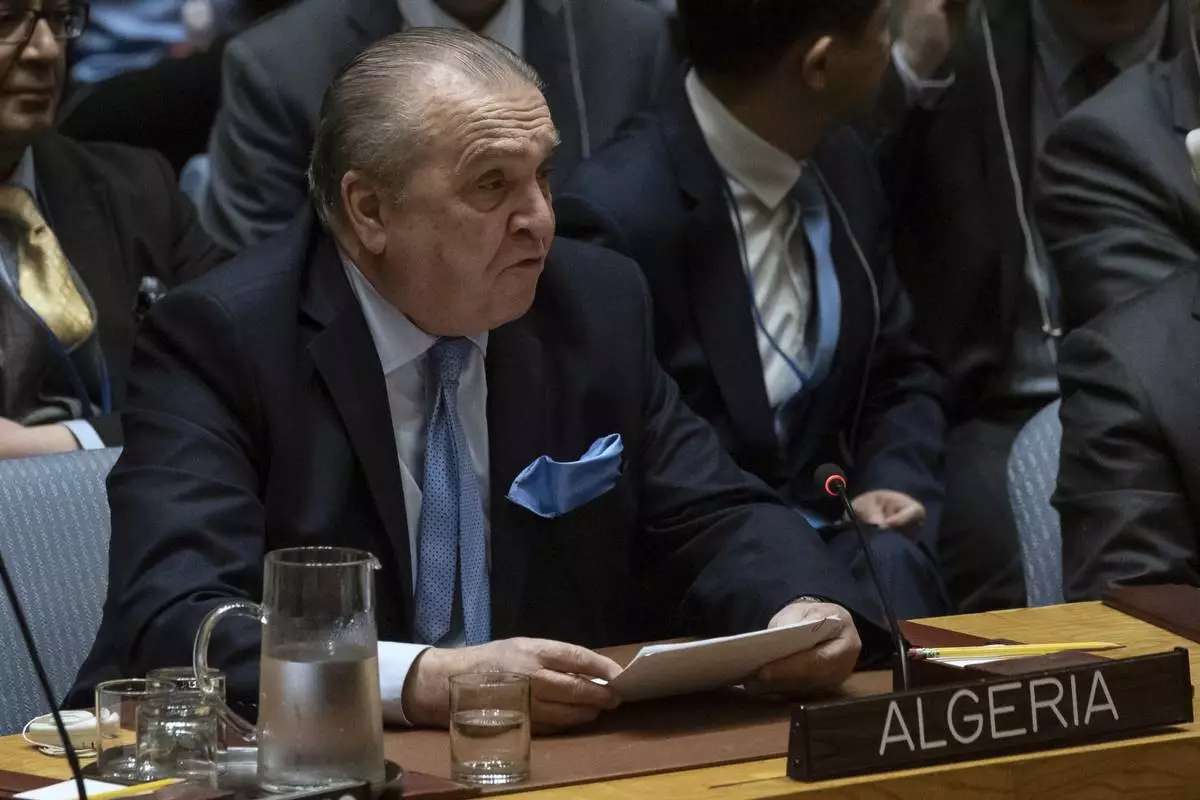
Algeria's Permanent Ambassador to the United Nations Amar Bendjama speaks during a Security Council meeting at United Nations headquarters, Thursday, April 18, 2024. (AP Photo/Yuki Iwamura)
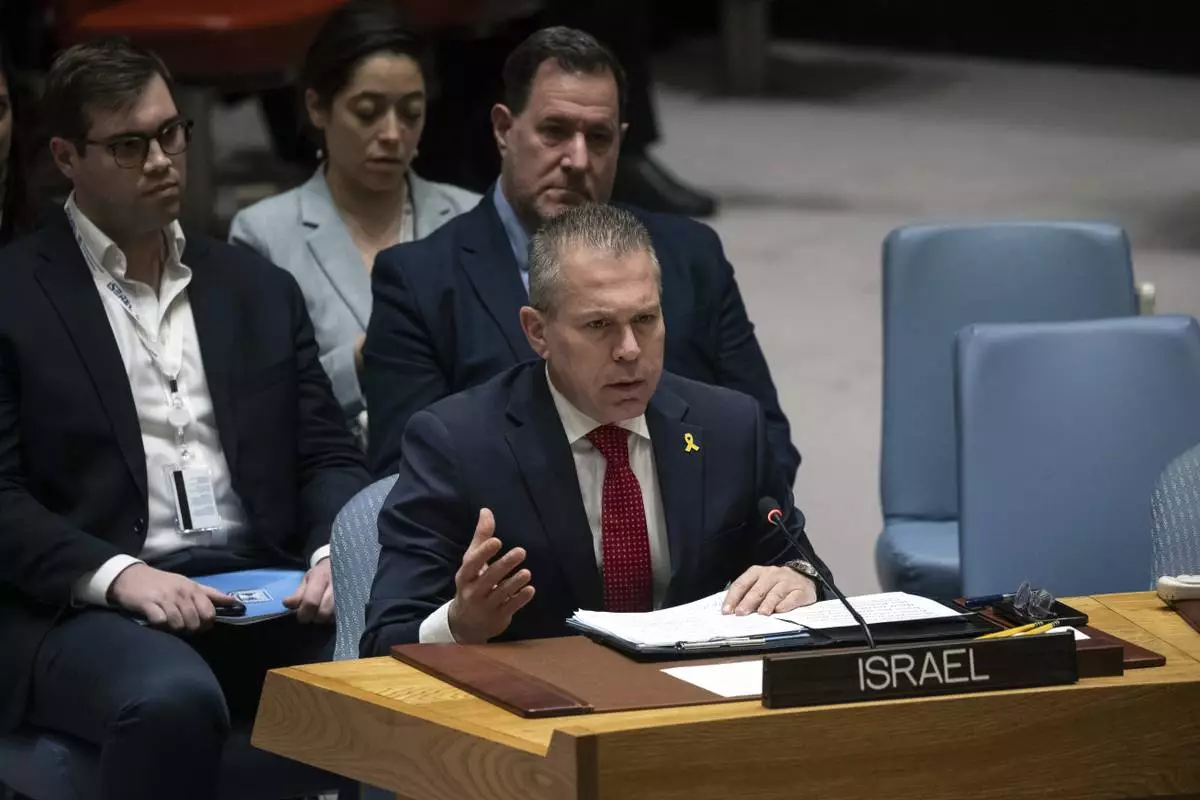
Israeli Ambassador to the United Nations Gilad Erdan speaks during a Security Council meeting at United Nations headquarters, Thursday, April 18, 2024. (AP Photo/Yuki Iwamura)
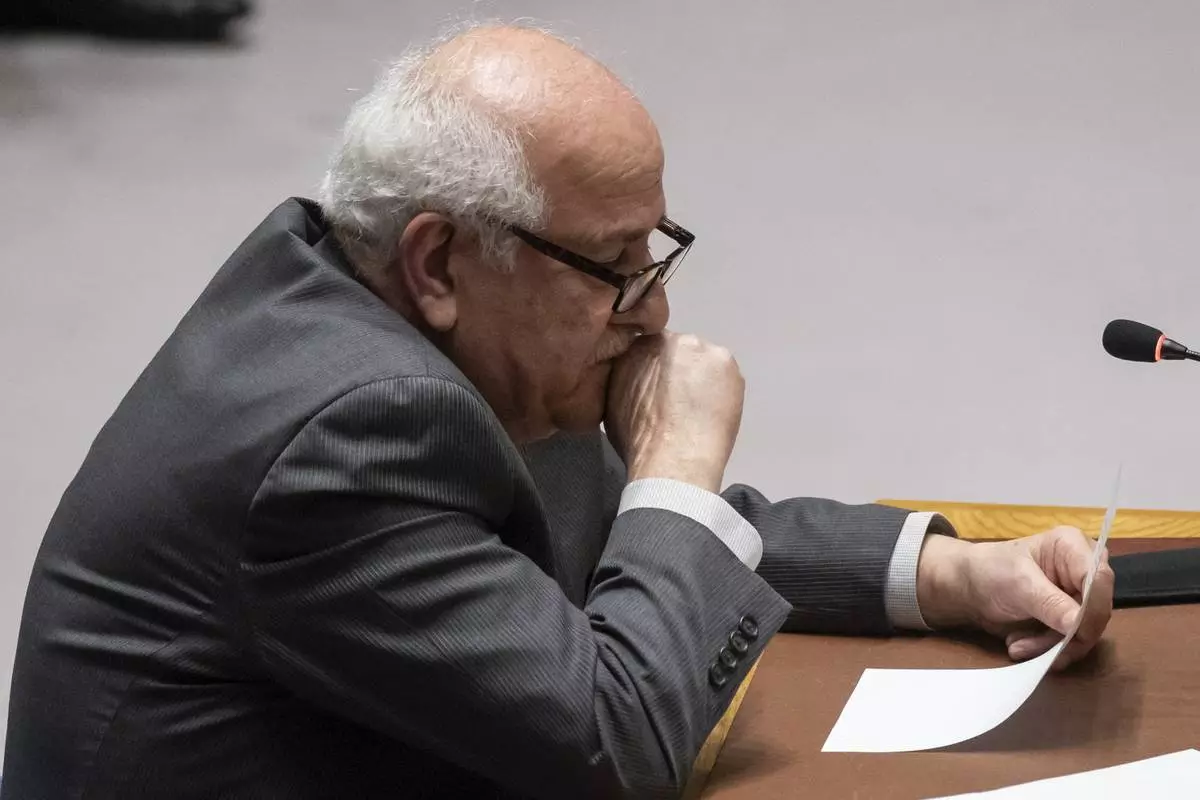
Palestinian Ambassador to the United Nations Riyad Mansour holds tears while speaking during a Security Council meeting at United Nations headquarters, Thursday, April 18, 2024. (AP Photo/Yuki Iwamura)
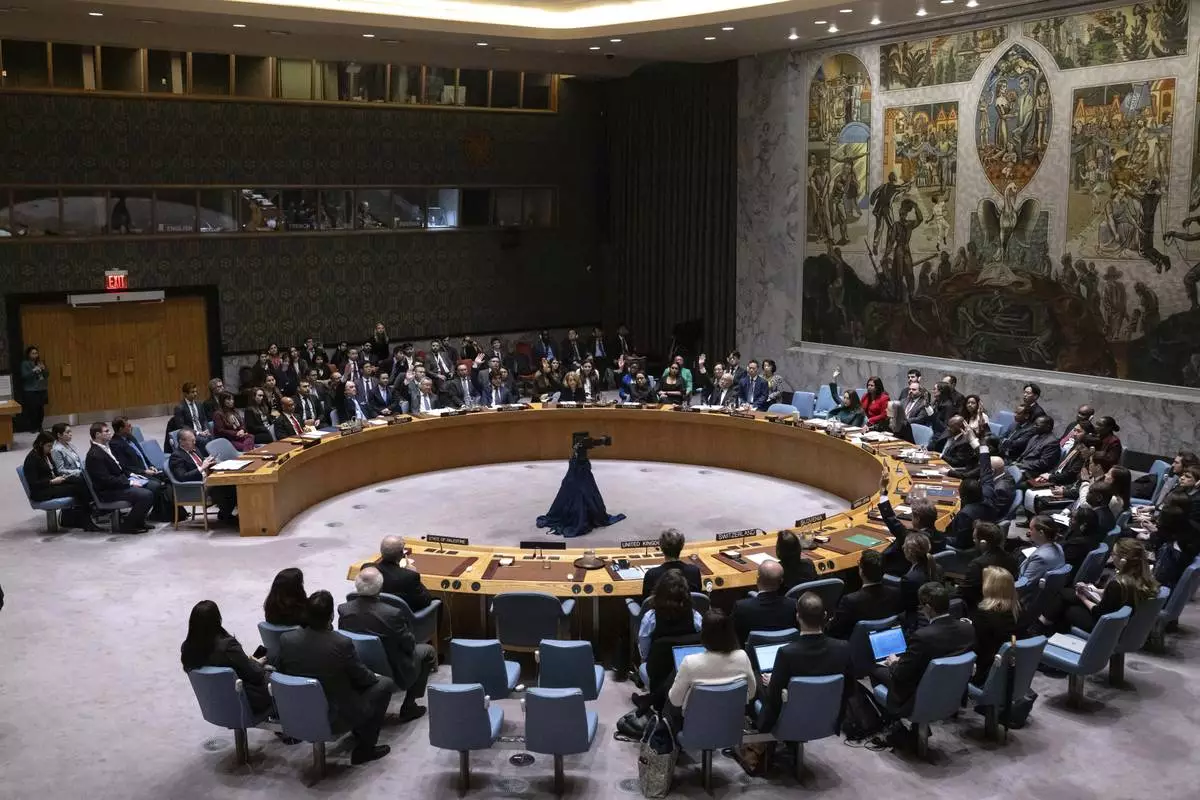
Representatives of member countries take votes during a Security Council meeting at United Nations headquarters, Thursday, April 18, 2024. (AP Photo/Yuki Iwamura)
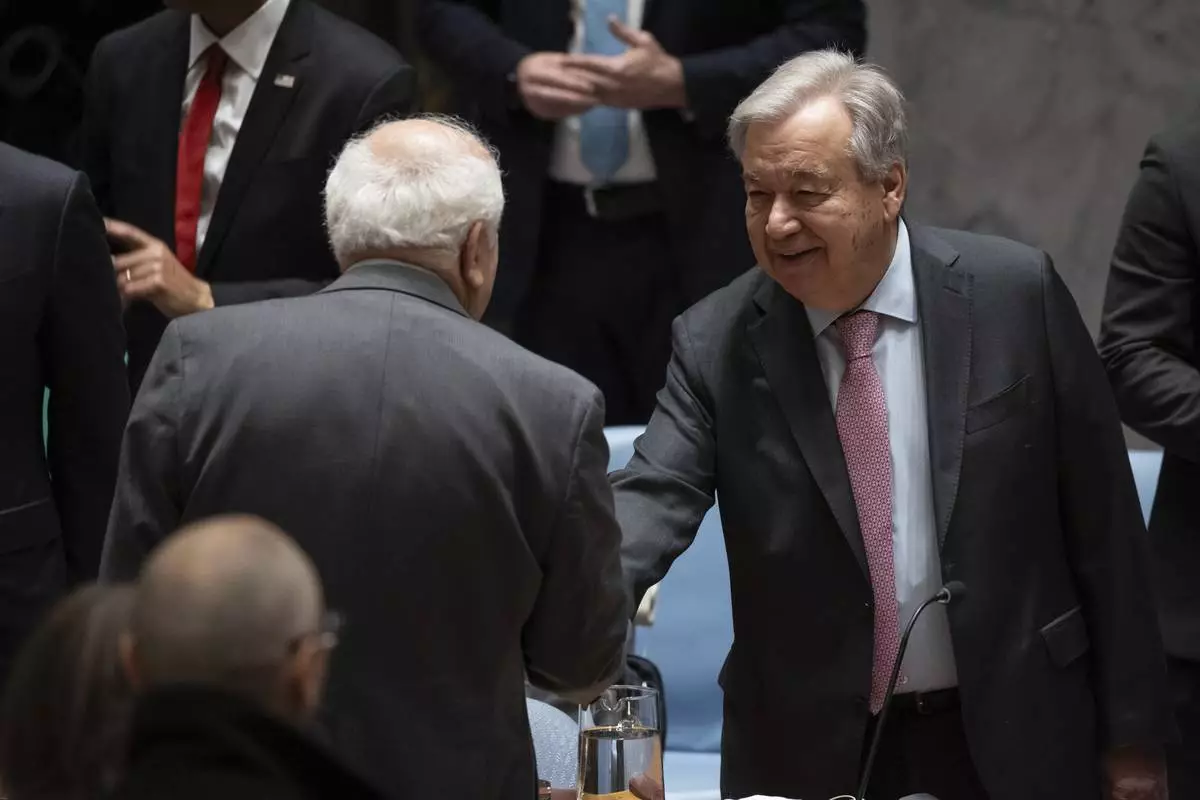
Palestinian Ambassador to the United Nations Riyad Mansour, left, and United Nations Secretary-General Antonio Guterres speak before a Security Council meeting at the United Nations headquarters, Thursday, April 18, 2024. (AP Photo/Yuki Iwamura)
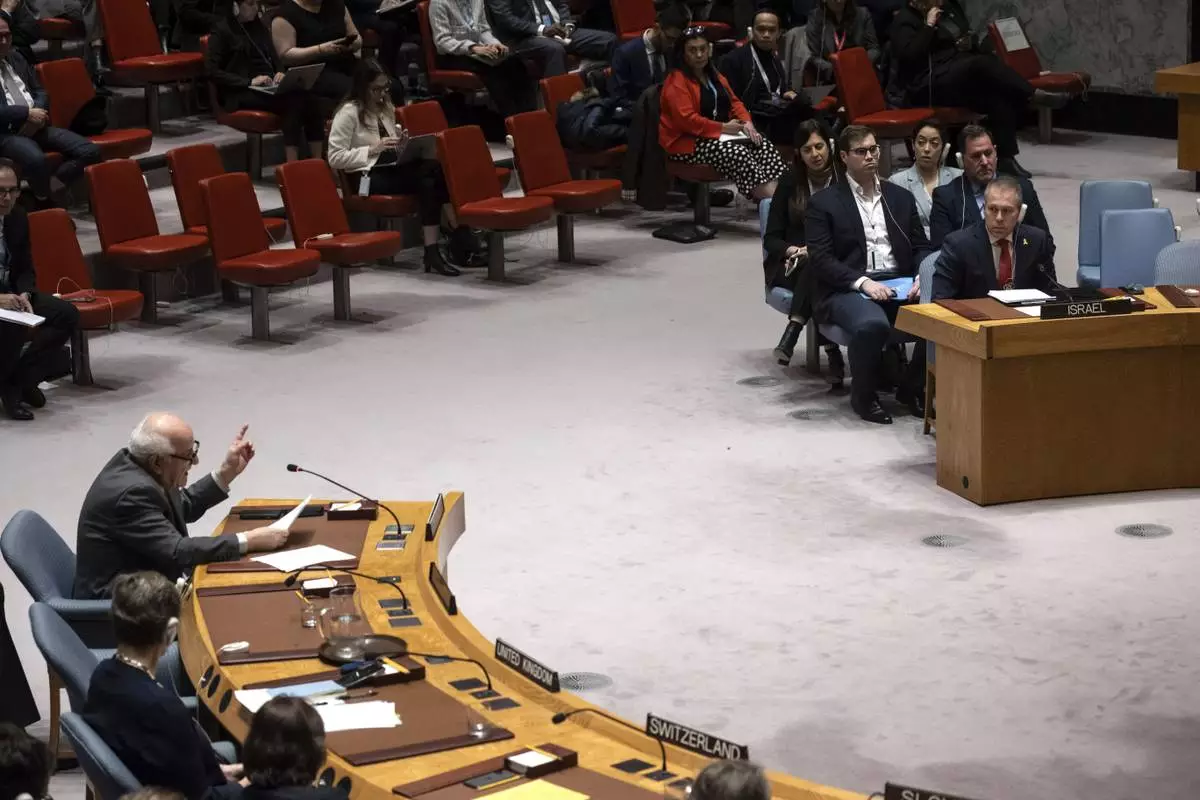
Palestinian Ambassador to the United Nations Riyad Mansour speaks during a Security Council meeting at United Nations headquarters, Thursday, April 18, 2024. (AP Photo/Yuki Iwamura)
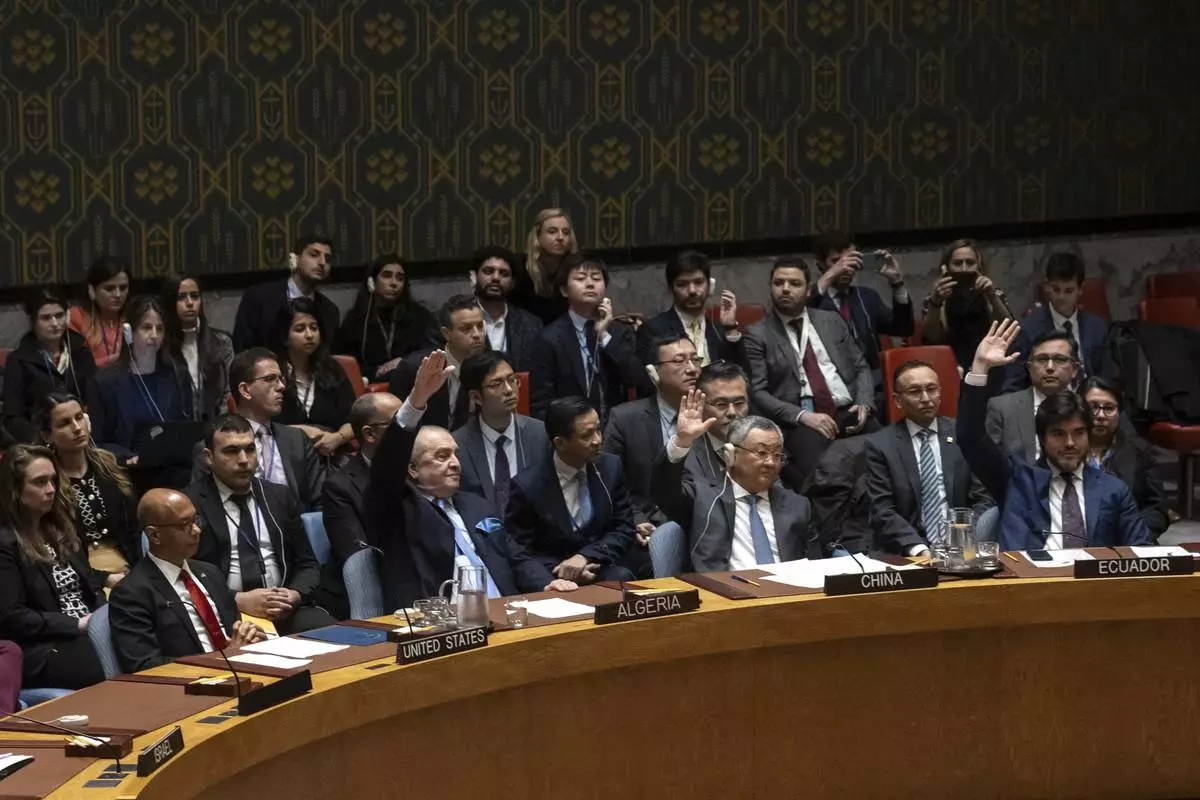
Representatives of member countries take votes during a Security Council meeting at United Nations headquarters, Thursday, April 18, 2024. (AP Photo/Yuki Iwamura)
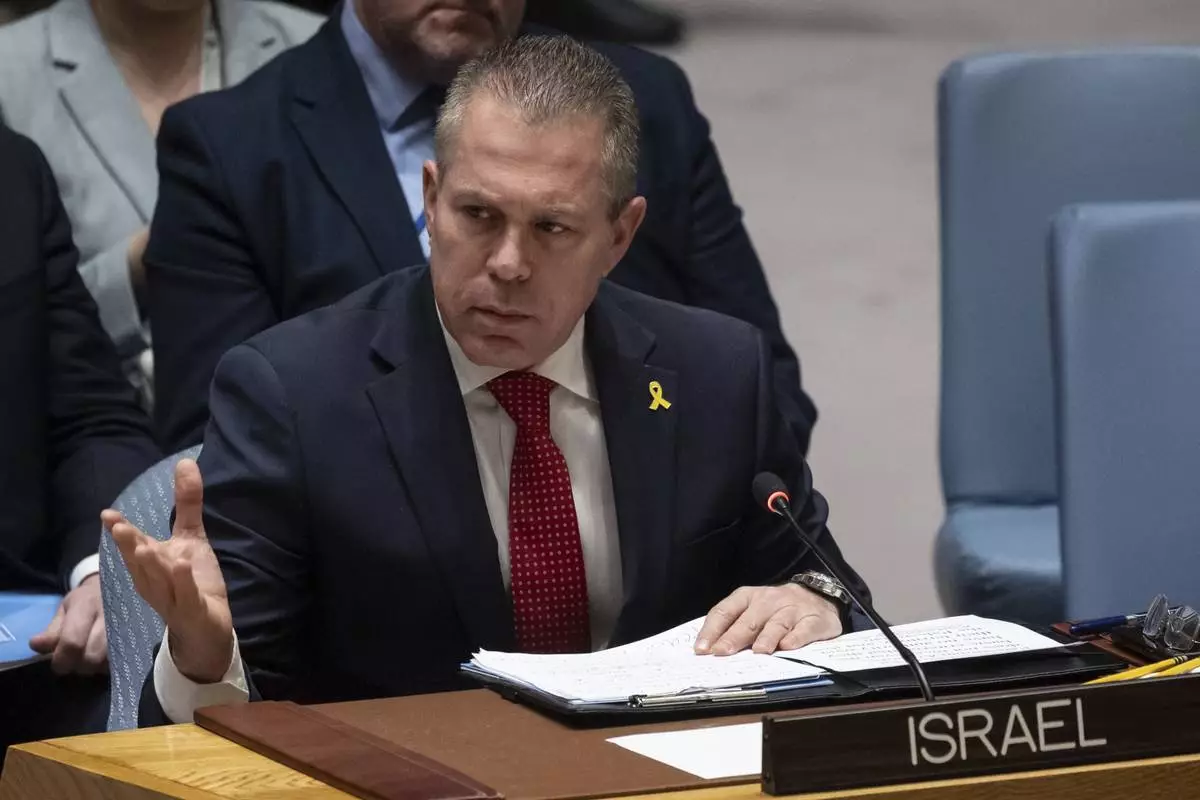
Israeli Ambassador to the United Nations Gilad Erdan speaks during a Security Council meeting at United Nations headquarters, Thursday, April 18, 2024. (AP Photo/Yuki Iwamura)
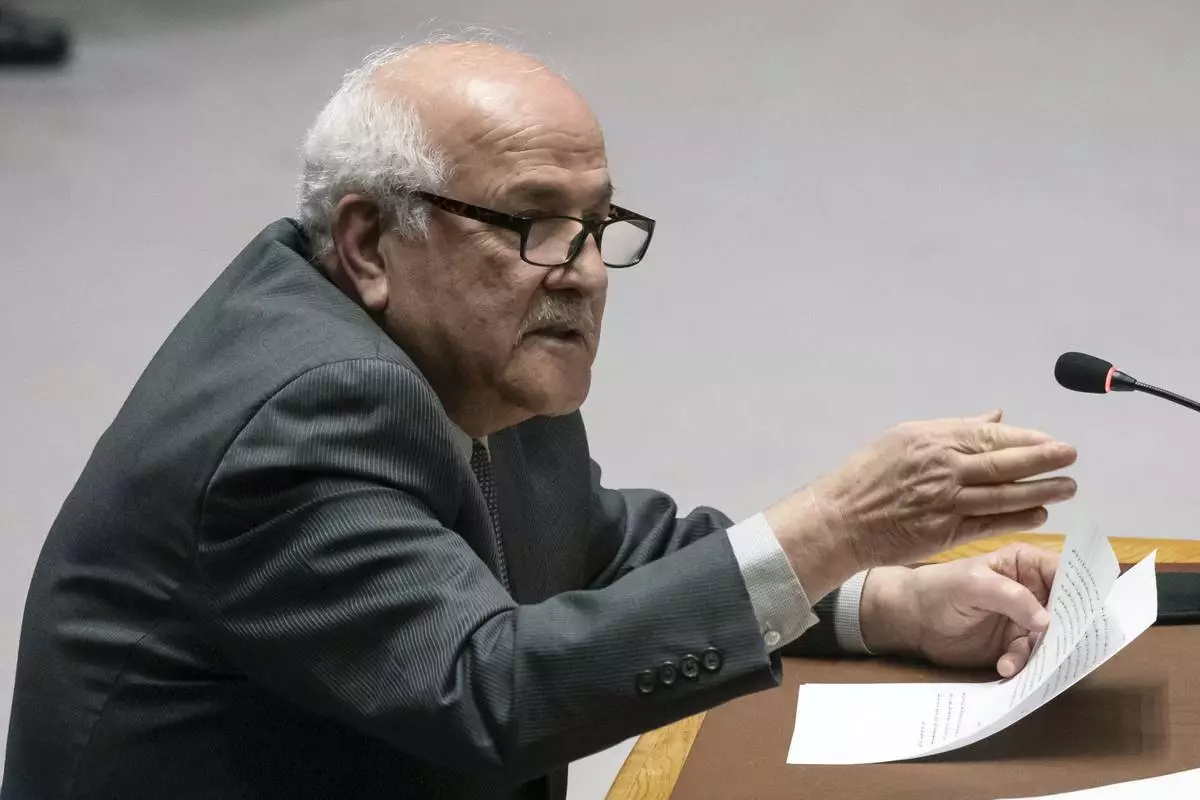
Palestinian Ambassador to the United Nations Riyad Mansour speaks during a Security Council meeting at United Nations headquarters, Thursday, April 18, 2024. (AP Photo/Yuki Iwamura)
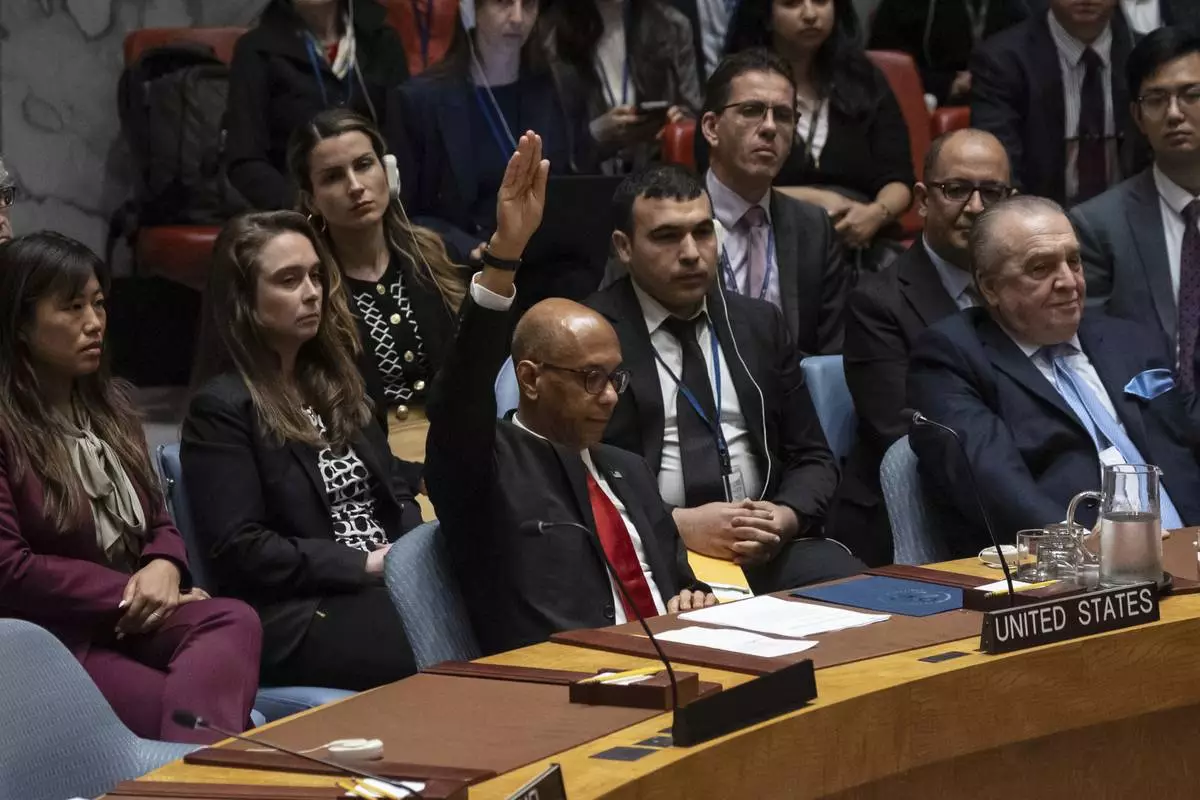
U.S. Deputy Ambassador Robert Wood votes against resolution during a Security Council meeting at United Nations headquarters, Thursday, April 18, 2024. (AP Photo/Yuki Iwamura)



















